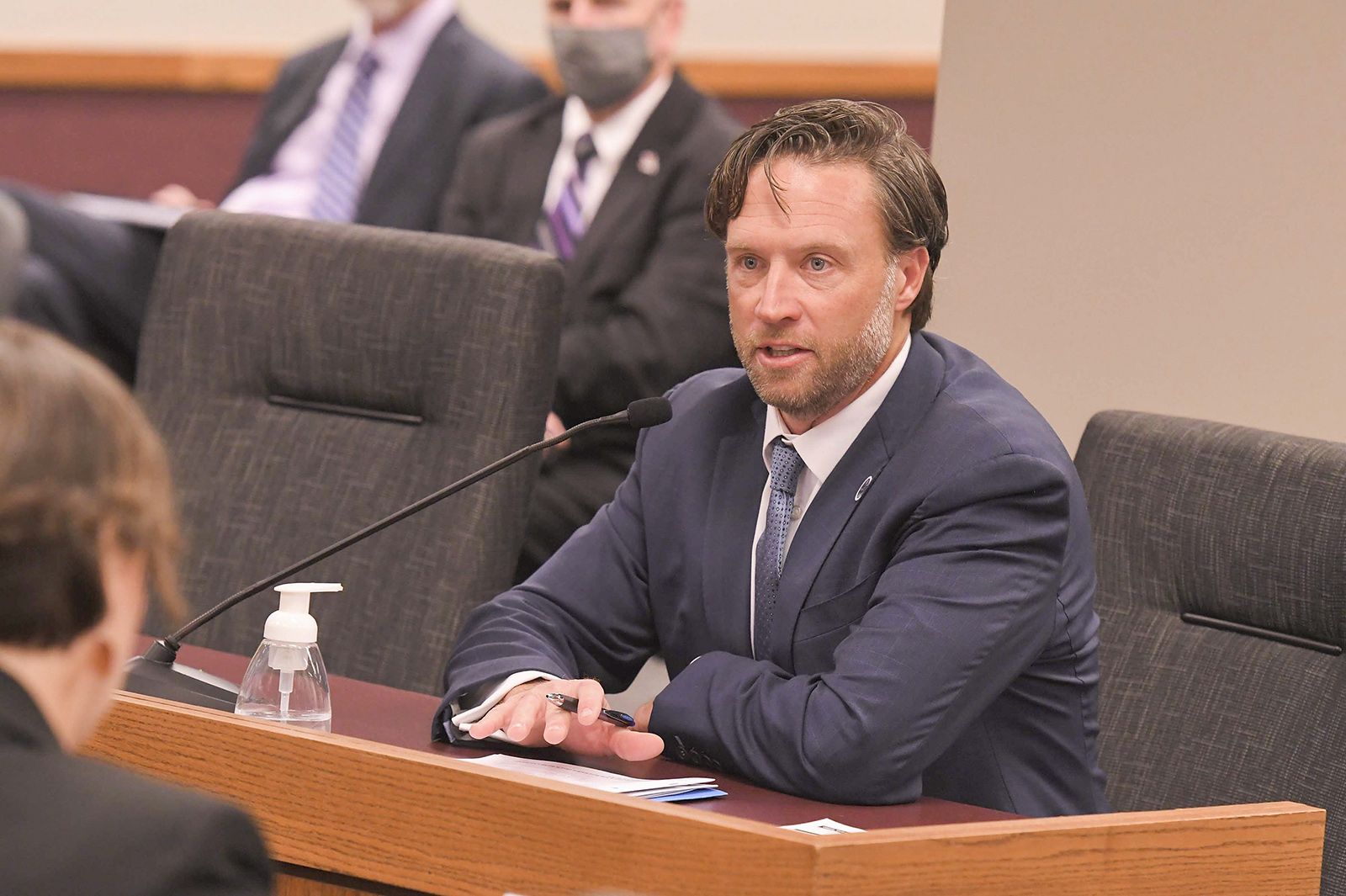Amidst all of the women running for state House seats in Springfield, Senate District 30 pits two men against each other.
Incumbent Republican Sen. Lincoln Hough is seeking reelection Nov. 8, while former House candidate and local attorney Raymond Lampert hopes to ride the same potential blue wave as other Springfield Democrats.
Redistricting in this year’s legislative session didn’t change District 30 drastically; it encompasses the majority of Springfield proper, and a few rural areas on the outskirts of the city.
Lampert, while aware of the challenge he’s up against in defeating Hough, is optimistic that Springfield is growing bluer.
“We have two state house members who are Democrats right now, Crystal [Quade] and Betsy [Fogle],” Lampert said. “We have some other great Democratic candidates in some pretty competitive districts, since the lines got redrawn. I think that is one of the bigger things that is going to help us in the upcoming election.”
Hough, while also aware the city he represents as a senator is becoming increasingly competitive, is confident in his campaign and that his voting record in Jefferson City is enough to give him another victory.
“I feel good,” Hough said. “We’ve got good folks that work for us, we’ve got good volunteers. We’ve got a good plan, we’ve raised good money, and quite frankly, I think my record for delivering results for our community is something that somebody can stand up on.”
This race concludes the Daily Citizen previews of local campaigns for the Missouri General Assembly. Find other preview stories and election coverage here.
Hough plays prominent role in Missouri legislature
Hough has long represented Springfieldians in one form or another since 2010, when he was elected to the Missouri House of Representatives and served three terms until 2016. Hough then served two years as a Greene County Commissioner, and, in 2018, he was elected to the state Senate, serving a four-year term.
After beating back a primary challenge from former Springfield Councilwoman Angela Romine, a victory Nov. 8 will give Hough the opportunity to serve a total of eight years in the legislature’s upper chamber, which would term him out and prevent him from running for state Senate again.

Hough, a Springfield native and Missouri State University graduate, owns and operates a cattle ranch near Fair Grove.
He serves on multiple committees in Jefferson City, and most notably is in line to become chairman of the Appropriations Committee. He also has served as chairman of Government Accountability and Fiscal Oversight and as vice-chairman of Local Government and Elections, among others.
Local attorney and frequent candidate, Lampert seeks to be a roadblock
Lampert is no stranger to running for political office, as he ran for Missouri House District 137 twice previously at the request of friends from local Democratic offices, but was unsuccessful in each race.
He was aware of the odds being stacked against him as a Democrat running in the very red, rural district of 137, but said it was a valuable educational experience, one where he realized Democrats and Republicans actually have a lot in common.

Lampert has lived in Springfield most of his life, and graduated from Drury University before going to law school at the University of Missouri. Since 2008, he has operated a solo law practice Lampert Law Office, where he specializes in unlawful workplace practices, harassment, discrimination, and wrongful termination.
The state’s role in addressing homelessness
With the passage of House Bill 1606, it is now illegal for someone to sleep on state-owned land without authorization. Some opponents to the law say it effectively criminalizes homelessness, while proponents argue it will help the homeless community.
Lampert is opposed to HB 1606, and argues the criminalization of the homeless, which he said has been around for centuries, won’t help anyone or improve the situation.
“Homelessness is a real problem, it’s an economic problem, it’s a moral problem, it’s a mental health and health care problem,” Lampert said. “It’s not, and it shouldn’t be treated as a criminal problem. This law, all it will do is fill up our jails and prisons with people who need help.”

Hough, who was supportive of and voted for passage in the Senate, said communities all around the state were asking for clarification on what they can and cannot do with individuals sleeping on various public properties.
“The intent is not, in my opinion, to criminalize that sort of behavior,” Hough said. “But it is to give a community, give a city the tools that they need to best govern their own communities.”
The future of Medicaid in Missouri
In 2020, Missouri voters passed Amendment 2, which amended the state constitution to include Medicaid expansion, with restrictions on income. However, since its approval on the ballot, the Missouri legislature and state courts have weighed in on budgeting limitations and eligibility requirements, among other concerns tied to the amendment.
In 2021, the Missouri Supreme Court reaffirmed Amendment 2 as constitutional, and the state was ordered to maximize federal funding and not prohibit enrollment.
Hough thinks that, with the decision by the state's highest court, “it was kind of the end of story.” However, he explained that with such an expensive system, tweaks and changes are necessary to make it run more effectively. Nonetheless, he thinks the legislature has received their orders and should adjust the budget to accommodate all of the Medicaid patients.
“Then the consideration is if people are eligible and can enroll,” Hough said. “Then what we’re talking about here is paying the reimbursement to the providers that are providing the care. So, to me, it’s kind of like, are you going to pay your bill or not? And in my opinion, yes we should.”
Lampert, not unlike Hough, thinks Medicaid expansion has been decided in Missouri and the state has a responsibility for fulfilling the will of the voter. “The voters clearly spoke, in fact, I voted the way that the majority of people voted when this was put on the ballot,” Lampert said. “It’s a matter of accepting the federal funding and the state should put forward the funding that it’s required to as well.”
Stances on abortion
With the overturning of Roe v. Wade, Missouri’s trigger law, HB 126 went into full effect, outlawing abortion in most cases, without an exception for rape or incest.
Hough, who voted for HB 126 back in 2019, is content with the measures taken by the state since the Dobbs decision.

“Now, where this changes is when you start talking about contraception, and I think this is where some people are going to have an opinion that is different from mine, but I don’t think that we need to go further than we have already gone in the state,” Hough said. “As soon as the Supreme Court handed that back down to the state, our [trigger law] is what it is. I think we are a staunchly pro-life state with a pro-life legislature, a pro-life governor, and I think we’re in a good place.”
Lampert, however, is strongly opposed to Missouri’s trigger ban, and thinks the legislature has a responsibility to restore the right to an abortion in the state.
“I believe simply that Roe v. Wade should be codified in our state law and probably our state constitution as well,” Lampert said. “The decision to whether or not have an abortion should be solely up to the individual and their physcian. I believe that the criminalization of abortion is a crime against women.”
Hough with significant edge in campaign contributions
Based on the most recent campaign finance reports filed by both candidates, Hough has just shy of $200,000 on hand, whereas Lampert has less than $7,000.
Many of Hough’s contributions come from various PACs, some of which are based in Springfield and others from other parts of the state. Most of Lampert’s contributions come from the local Democratic Alliance and small individual and large PAC donations from around the country.
(Editor’s note: Daily Citizen Board Chairman Thomas Carlson and his wife Chandler made a donation to Hough’s campaign. Board members play no role in news coverage decisions.)
Where and when to vote, and what you need to bring (Click to expand story)
When and where: The general election will take place on Nov. 8. Polls open at 6 a.m. and close at 7 p.m. You can identify your polling location here. Information on absentee voting in Greene County can be found here.
Finding your district: Information about what state House and Senate district you might live in can be found here.
What you need: This is the first election that Missouri’s new photo ID law will be in effect. The Secretary of State’s website provides information about what forms of ID will be acceptable.

